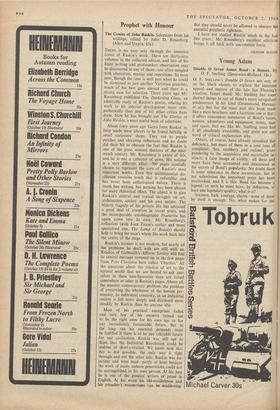Prophet with Honour
The Genius of John Ruskin. Selections from his writings, edited by John D. Rosenberg. (Allen and Unwin, 45s.) THERE is no easy way through the immense forest of Ruskin's work. There are thirty-nine volumes in the collected edition, and bits of his finest writing and profoundest observation may be discovered in any of them—too often mingled with obsessions, manias and repetitions. So even now, though the time is well past when he could be dismissed as just another Victorian preacher, much of his best goes unread and there is a strong case for selection. Three years ago Mr. Rosenberg published The Darkening Glass, an admirable study of Ruskin's genius, relating his work to his interior development more sym- pathetically than any of his other critics have done. Now he has brought out The Genius of John Ruskin, a most useful book of selections.
About forty years ago 'Gems from Ruskin' in limp suede were always to be found lurking in small stationers' shops. They ran to purple patches and elevating reflections and no doubt did their bit to obscure the fact that Ruskin is one of the great seminal thinkers of the nine- teenth century. Mr. Rosenberg is aware of this, and he is not a collector of gems. His volume is a very different affair-500 pages carefully chosen to represent the 'core of Ruskin's most important works. Even this quintessential dis- tillation contains much that is unfamiliar and has never been anthologised before. There is much fine writing, but nothing has been chosen for mere rhetorical effect. The object is to give Ruskin's central and typical thoughts on art, architecture, society and his own nature. The bizarre tragedy of his private life has attracted a good deal of attention in recent years, and the incomparable autobiography Praeterita has again come into its own. Mr. Rosenberg's collection (with Joan Evans's earlier and more specialised one, The Lamp of Beauty) should help to bring the man's whole life-work back into the, centre of the stage.
Ruskin's manner is not modern, but nearly all the problems he dealt with are still with us. Readers of Galbraith's Affluent Society will find its central message summed up in the few pages from Fors Clavigera here called `Charitas.' All the questions about the relation of art to the natural world that we are bound to ask our- selves in these non-figurative days are raised somewhere or other in Ruskin's pages. Above all, the massive contemporary problem, the problem of preserving the wholeness of the human per- sonality, its individual creativity, in an industrial society is felt more deeply and discussed more steadily by Ruskin than by anyone else.
Most of his practical enterprises failed and very few of his answers turned out to be the right ones for his own age or for any immediately foreseeable future. But in the long run his essential demands must be fulfilled if there is to be any tolerable future for our civilisation. Ruskin was still apt to think that the Industrial Revolution could be undone or short-circuited. We know now that this is not possible; the only way is right through and out the other side. Ruskin was im- patient and went mad—partly at least because the work of many unborn generations could not be accomplished in his own person. At his best he is one of the greatest writers of prose in English. At his worst his old-maidishness and his preacher's mannerisms can be maddening. But they should never be allowed to obscure his essential prophetic rightness.
I have not studied Ruskin much in the last few years : Mr. Rosenberg's excellent selection brings it all back with uncommon force.
GRAHAM HOUGH














































 Previous page
Previous page